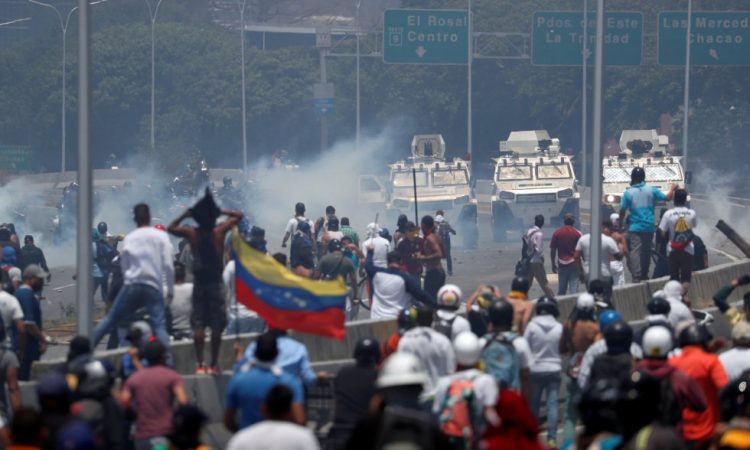Thousands of Venezuelans took to the streets of Caracas to support the opposition’s offensive

Caracas woke up with the corneteos of the cars, shouts and cacerolazos. From early, without much information of what is happening, thousands of people moved to the military base of La Carlota. In the absence of transportation, groups with flags were seen walking along the highways that were then concentrated in front of the military installation, a huge esplanade located in the center of the city crossed by the main highway and the Guaire River. There were from a quarter to six in the morning (local time) the opposition Juan Guaidó with Leopoldo López, deputies of the National Assembly and other political leaders.
The huge group that approached from the southeast walking was blocked by the rain of tear gas thrown from the military base, to which some responded with stones. After hours of scuffle, in which several people were injured, a piece of about 300 meters from the fence of La Carlota was shot down and the roof of a shed caught fire. Part of the crowd began to retreat without being able to enter the military airport and without knowing what to do and where to go. Some stayed in the vicinity waiting for information, others tried to reach Altamira bordering the end of the military base, by the bridges over the Guaire. Some of these points were guarded.
“I woke up and had a message saying that Guaidó was talking. I verified on Twitter and I came walking. I think we should wait, because in the street we can not know what is happening, there is no sign. There must be a strategy, they must be adding more people. When I left this morning I knew that we could go ahead with this or maybe go back a bit, “said Isaac De Castro, 33-year-old theater director, who was returning without having managed to cross to Altamira where the opposition leaders moved. Most of the protesters, who at midday tried to march west of the city.
Alexis Ramos, a 76-year-old university professor, approached the bridges near La Carlota to look at what was happening beyond the only thing clear up to that point: spicy air and a lot of smoke from the gases used to suppress the demonstrators. “We are in uncertainty, we do not know the result of this. That is supposed to follow a plan. But so far we do not know. This obviously creates expectations of achieving the cessation of the usurpation, but Guaidó always talks about this is a process that will not have an outcome in the short term. But here the only thing that sustains the Maduro government is the military high and Cuba, “he said. “It is that people are very negative, leaving these people is not easy”, added anguished his wife Dianora Cisneros, with the flag of Venezuela placed as a cape.
The demonstrations went ahead suddenly, Guaidó and López urged the population to accompany them on the streets. The Chavez forces continued the same course, summoning their followers, including the militiamen, to occupy the surroundings of the Miraflores Palace. But Nicolás Maduro did not appear before his loyalists. His allies, led by Diosdado Cabello, the vice president of the United Socialist Party of Venezuela, settled on a platform of the presidential palace to defend the bastion of power in Caracas. “We do not want whining, that each one assumes his responsibility that we will assume ours”, warned the number two of the ruling party.
The challenge of the Maduro government was to demonstrate control over the institutions, especially the Bolivarian Armed Forces. The military, with tanks and rifles, deployed in some neighborhoods west of the city. Karina Merchán, an administrator who came out to show her support for Guaidó, said that a curtain of tear gas covered the surroundings of the air base, where initially the opposition leadership was concentrated. “We got a rain of tear gas bombs, we mobilized for those. We want to stay on the street to fight for democracy, “he said. In the east of Caracas there were scuffles with tear gas and even bullets. In several clinics in the city, the entrance of some wounded due to the revolt was reported, according to doctors.
The information blockade was accentuated on the Internet. The YouTube channel was censored, while social networks such as Twitter and Facebook did not function normally from the platform of the government company CANTV. The National Commission of Telecommunications (Conatel), rector of the communications in Venezuela, censured to the radio station Radio Caracas that informed in direct of the events, according to the Syndicate of Press.
With information from El País.







